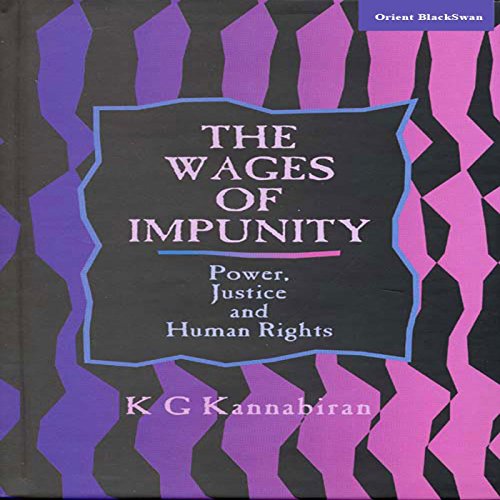The Constitution is supreme in India, and this has been established over decades through jurisprudence (judgements of the constitutional courts), practices and convention. Why is the Constitution the Supreme? This is because it draws its power from the people. The values and ethos of India’s freedom struggle, enshrined in the Constitution, guide people towards a more egalitarian society.
The book, Wages of Impunity: Power. Justice and Human Rights, a collection essays written by the late K.G Kannabiran, a renowned Human Rights lawyer- points out the importance of values enshrined in the constitution and how they do not see better implementation on the ground. For this, he argues that the reason is the impunity which has been accorded to people and institutions which do not follow the law. The book’s relevance to this day is both fascinating and truly concerning. To explain this statement, I will take the help of some themes that recur in the book.
The author argues that India has a culture of impunity, in which state violence is sanctioned by law and there is little judicial oversight. He believes this culture of impunity has been sustained by a disconnect between the lofty principles of the Constitution and their implementation on the ground, as well as the uncritical acceptance of colonial traditions and jurisprudence. He argues that these factors have led to the weakening of rights-based jurisprudence in India.
The arguments in the book are based on author’s experience as a human rights lawyer and activist. He has seen firsthand how the culture of impunity has allowed state violence to go unchecked, and he believes that it is a major obstacle to the realization of human rights in India.
There are some common themes that the book deals with. One is how the individual rights with respect to personal liberty always took a back seat, in interpretations by Judiciary -especially until the 1970s- and how the individual rights related to property were given due importance- an anomaly when seen within the matrix of constitutional values. Kannabiran calls this the honouring of a Colonial Legacy, another theme within the book. This reference of Colonial Legacy becomes important in his book when we look for reasons as to why the frameworks on civil liberties have remained much in the same previous place as they were, despite a liberal and empowering Constitution. The book states “policies of the government of the day are forever being equated with national interests, an equation that ignores or overrides every Constitutional principle assuring limited government.” The relevance of this statement stands true today, 16 years after the publishing of this book. The recent law commission’s report that recommended for more power to the Section 124A-Sedition is an example of the carrying forward of colonial practices.
Another theme that the book imbibes is the theme of anti-communalism and a secular stand. Relying on the Supreme Court’s judgement in SR Bommai vs. Union of India, 1994 in which the apex court declared Secularism to be a part of Basic Structure of Constitution, the author questions the legitimacy of anti-secular parties to be eligible to govern the country. Professing theocratic principles or propounding the Hindu religion as the ruling religion of the state, he declares, disentitles these parties from continuing in power.
In another chapter, dealing with the 2002 Gujarat Violence, the author makes an important statement. He says, “A formal compliance with the law, a routine engagement with justice will not keep justice alive.”
He adds that, as emphasized in the Constitution, Justice- Economic, Political and Social- should inform all institutions of state. What this presents is that the fight for justice is not restricted to Court or such legal institutions but in empowering all institutions of the state and society to be just. References to gods in elections by leaders and asking for votes in their name is just a small and recent example of the way communalism has found its way into mainstream politics and solidified its place.
Another important theme in the book, for which he is most known in the Telugu states is his opposition to extra-judicial killings, and the impunity with which the police is protected. Describing an encounter of two people in Andhra Pradesh in which one person was not at all connected in any way to the case of other – in which the police demonstrably acted without legal restraint – the author states “The political objective (not translated into law) of rooting out extremism seems to have been sufficient justification for acting beyond the limits of the law.” This statement is rich in terms of relevance again. Today, a majoritarian political objective professed and advocated by the ruling establishment- finds strength to take law into its hands. Going a step beyond, the political objective is not being fulfilled by the state but by the fringe elements like the anti-cow slaughter groups which have a militant character-with impunity.
It is hard, when you re-visit this book, not find recent examples of all themes the author explores in his essays. It is not a pleasant task to find and locate such examples and their prevalence.
Should you read the book? Yes. Not only does it deal with themes, but there is also an underlying thread that runs through almost all his essays- an unwavering faith in Constitutional values and his fight for such values to be upheld. And, apart from the themes, the books present a peek into Kannabiran’s life of defending the rights of those people who would find themselves at the mercy of a criminal justice system designed to oppress them.
(The author is a legal researcher with the organisation)
Related:

